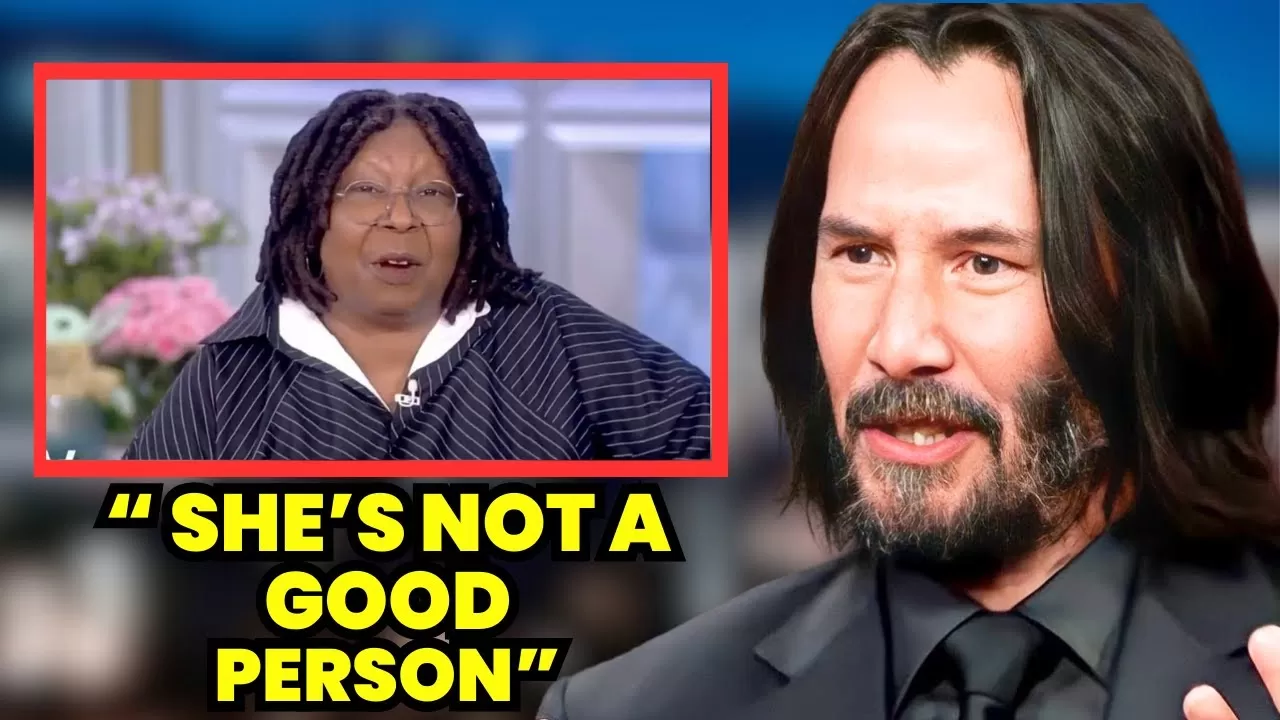Keanu Reeves is often hailed as one of Hollywood’s most genuine and kind-hearted figures, while Whoopi Goldberg’s divisive reputation has earned her a significant amount of public scrutiny. Recently, a viral tweet claimed that Reeves refused to present Goldberg with a Lifetime Achievement Award, stirring widespread intrigue and debate. This article aims to unpack the layers of this sensational story, scrutinize its origins, and uncover the truth behind these headlines.

A tweet from the account Punchy Plays suggested that Keanu Reeves had declined the role of presenting Whoopi Goldberg with a coveted Lifetime Achievement Award. The tweet quoted Reeves saying, “She’s not a good person. Do you agree or disagree with him?” This statement caused an immediate stir, attracting a multitude of comments and reactions.
For many, the idea that Reeves—an actor beloved for his humble demeanor and philanthropic efforts—would publicly criticize another celebrity was shocking. Moreover, rumors swirled about other celebrities, including Justin Timberlake, Winona Ryder, and Gloria Estefan, allegedly also refusing this presentation role. Reeves purportedly stood firm in his refusal, asserting that no amount of persuasion would change his mind.
Upon further investigation, it becomes apparent that the tweet wasn’t based on verified events. The viral tweet linked to an article posted by lin.com comma, a website associated with America’s Last Line of Defense, a network known for disseminating satirical and fictitious news. This network has a history of fabricating stories for entertainment rather than providing factual journalism.
For instance, an earlier article claimed that the Academy Awards had decided to replace Goldberg with Reeves as the host for the 109th annual ceremony, citing her controversial and toxic public image. Committee chairman Joe Baron was quoted as saying, “I’d say it was a difficult decision, but it really wasn’t. She more or less did this to herself.”
It’s crucial to recognize that America’s Last Line of Defense and similar networks produce content that blurs the line between satire and reality. Over the years, several fabricated stories from these sources have gone viral, often misleading the public.

A notable example includes a story from Dunning Krueger Times—a site linked with America’s Last Line of Defense—claiming that KitchenAid was removing its products from Target in response to the company’s support for LGBTQ Pride. The article, designed to provoke reactions, was widely shared and even amassed significant traction on the America Love It or Leave It Facebook page.
Another fabricated story purported that Texas Governor Greg Abbott had shared a fake news article from Dunning Krueger Times, which falsely reported that singer Garth Brooks was booed off stage in a non-existent Texan town.
In the modern media landscape, no celebrity is immune to the effects of misinformation. The blending of satirical content with mainstream news can lead to confusion and controversy, as seen in the Reeves-Goldberg narrative. Unfortunately, such stories can perpetuate falsehoods, damage reputations, and incite public backlash based on unfounded claims.
Celebrities like Taylor Swift have also faced their share of misinformation, highlighting the broader issue that no public figure is entirely exempt from the perils of fake news. The damage wrought by these fabricated stories can be extensive, influencing fans’ perceptions and potentially altering the course of careers.
In the case of Keanu Reeves and Whoopi Goldberg, it’s essential to clarify that the narrative of Reeves refusing to present an award to Goldberg due to her questionable character is unsubstantiated. The viral tweet and related articles originate from sources known to deliver satirical and fictional news content.
Reeves has not publicly commented on the rumored award presentation, nor have reputable news outlets confirmed his involvement in such an event. Likewise, Goldberg’s status within the entertainment industry, despite her controversies, remains significant, and no credible reports have suggested her removal from the Academy Awards hosting role.
The viral tale of Keanu Reeves rejecting the opportunity to present an award to Whoopi Goldberg underscores a growing issue in today’s media environment: the rampant spread of misinformation and the difficulties in distinguishing fact from fiction. As consumers of news, it’s essential to scrutinize the sources of such sensational claims and seek out reliable, fact-checked information.
In an age where satirical content can easily masquerade as real news, awareness and skepticism are powerful tools. By questioning the veracity of viral stories and understanding the motivations behind their creation, we can better navigate the complex landscape of modern media and avoid falling prey to misleading narratives.
As for Keanu Reeves and Whoopi Goldberg, the truth appears far less dramatic than the fiction, reminding us all to dig deeper beneath the surface of sensational headlines.
Relative Articles
None found





